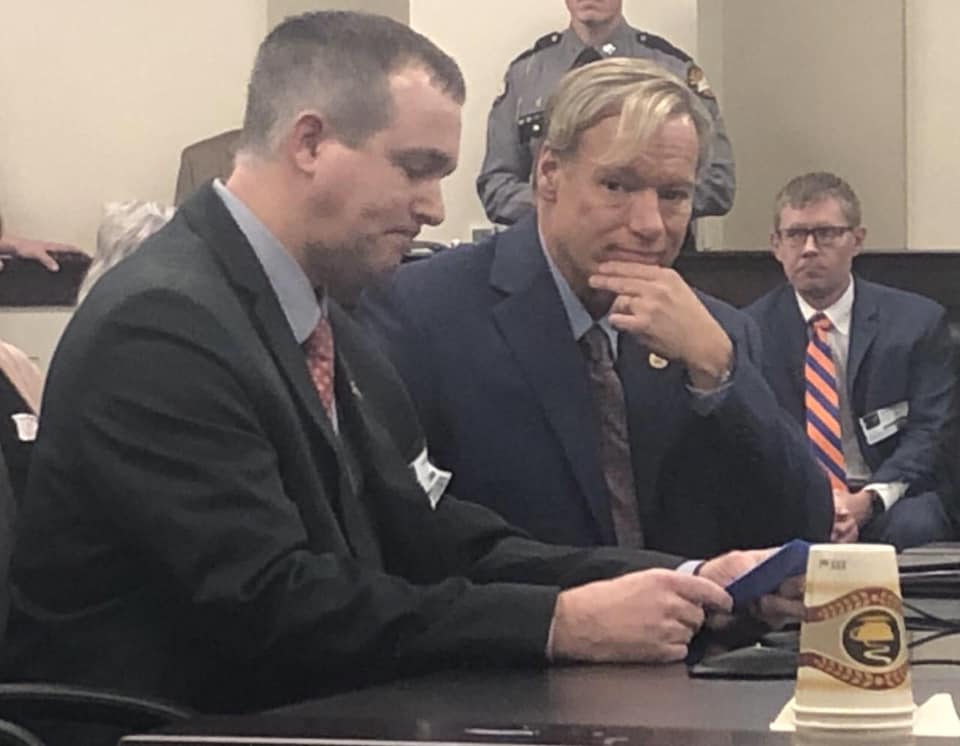
2020's HB 174, sponsored by "Representative Chris Freeland, R-Benton, has been re-filed. Freeland's bill was moving in the 2020 Regular Session of the General Assembly but stalled when COVID eclipsed routine legislative business.
https://apps.legislature.ky.gov/record/20rs/hb174.html
https://apps.legislature.ky.gov/recorddocuments/bill/20RS/hb174/bill.pdf
21RS HB 273 is the latest iteration of Freeland's bill. Like the 2020 bill, it would create a new exception to the Kentucky open records law for "photographs or videos that depict the death, killing, rape, or physical or sexual assault or abuse of a person."
https://apps.legislature.ky.gov/record/21rs/HB273.html
https://apps.legislature.ky.gov/recorddocuments/bill/21RS/hb273/orig_bi…
Both bills were prompted by the release of video taken in the aftermath of the 2018 Marshall County High School shootings.
The 2021 bill mirrors the 2020 bill. It omits the vague adjective "gruesome" that appeared in the original 2020 bill. It also includes the 2020 committee substitute that reconciled the proposed exception with existing law governing access to body worn camera video and established a right access for named parties.
Even after these changes were made in 2020, opponents predicted that the bill would "likely face immediate challenge over its constitutionality [insofar as] it runs afoul of the separation of powers and the 1st Amendment right of access to court proceedings."
https://www.kentuckynewera.com/ep/opinion/article_a7eb1ab3-226a-5b53-9b…
The Kentucky Open Government Coalition objected to the vagueness of the "gruesome" language and the potential for abuse this subjective standard created in a series of 2020 posts.
https://www.facebook.com/419650175248377/posts/578076369405756/?d=n
https://www.facebook.com/419650175248377/posts/591841984695861/?d=n
https://www.facebook.com/419650175248377/posts/622907518255974/?d=n
We argued that the proposed exception to the open records law is, once again, a solution in search of a problem.
The personal privacy exception in the current law, we argued, authorizes public agencies to withhold "public records containing information of a personal nature where the public disclosure thereof would constitute a clearly unwarranted invasion of personal privacy."
"Judging by order, if nothing more," Kentucky's Supreme Court has observed, "one might say that (1)(a) [the privacy exception] is the foremost exception to the disclosure rule.
"The language of subsection (1)(a) reflects a public interest in privacy, acknowledging that personal privacy is of legitimate concern and worthy of protection from invasion by unwarranted public scrutiny."
https://law.justia.com/cases/kentucky/supreme-court/1992/90-sc-498-dg-1…
The privacy exception is successfully invoked in cases where the public's interest in disclosure of a record is outweighed by the privacy interests implicated by the record's disclosure. In such cases, disclosure is said to constitute "a clearly unwarranted invasion of personal privacy."
It is a standard that requires, in most instances, a case by case analysis of the competing public and private interests rather than an absolute barrier.
Victims and surviving family members have a strongly substantiated personal privacy interest in photographs or videos depicting "death, killing, rape, or physical or sexual assault or abuse of a person" that has been deemed, in many instances, to outweigh the public's interest in disclosure.
But events in 2020 — the killings of Ahmaud Arbery, George Floyd, Rayshard Brooks, and — closer to home — David McAtee, on bystander or surveillance video confirm that in other instances there is a compelling public interest in disclosure that outweighs privacy interests.
The creation of a new exception erecting a absolute barrier, short of court ordered disclosure, to photographs and videos that directly or indirectly relate to the performance of public agency duties, fails to take these grim realities into account.
It is incumbent on public agencies, in all instances, to weigh these competing public and private interests and "scrupulously perform their duty" to ensure that non-privileged materials are released, and privileged materials are not released, in response to open records requests.
If we could speak to Rep. Freeland and the parents of victims of the Marshall County High School shooting, we would assure them that the privacy exception found in the current open records law adequately protects both the public and private interest in "photographs or videos that depict the death, killing, rape, or physical or sexual assault or abuse of a person."
Past opinions of the Kentucky Attorney General verify this fact. For example, in 2015 the attorney general affirmed a law enforcement agency's denial of a request for
death scene photographs of a child accidentally killed by a vehicle under the privacy exception where the family had requested the photographs not be released and the integrity of the investigation was not in question.
https://ag.ky.gov/Priorities/Government-Transparency/orom/2015/15ORD197…
Adding yet another exception to the alphabet soup of exceptions to the open records law serves no purpose.


